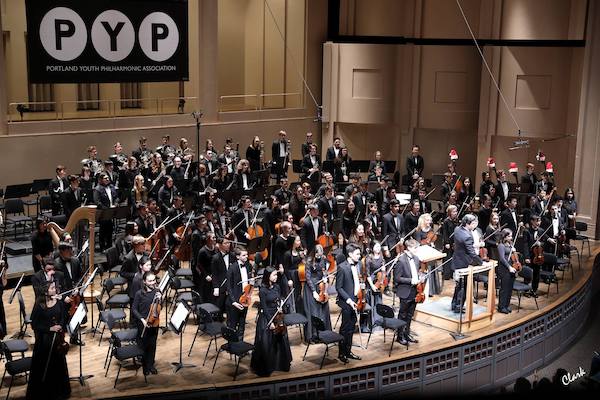Classical Concert Preview: Portland Youth Philharmonic’s East Coast Centennial Tour
By Jonathan Blumhofer
The Portland Youth Philharmonic’s East Coast tour allows the ensemble, whose membership is mostly drawn from the city of Portland, Oregon, and its nearby suburbs, to showcase their artistry in venues that will do them sonic justice, including Worcester’s Mechanics Hall.

The Portland Youth Philharmonic taking a bow. Photo: PYP
“We’re the first [youth orchestra] to turn 100,” is how David Hattner described his Portland Youth Philharmonic (PYP) with a laugh when we spoke recently.
The ensemble, the oldest of its type in this country, was founded in 1924 by Mary V. Dodge and Jacques Gershkovitch. Five music directors later (Hattner’s been in his post since 2007), the PYP celebrates its big anniversary with an East Coast tour that began on Monday night at the Music Center at Strathmore in North Bethesda, Maryland, and is now making its way north to Philadelphia and New York City, and concluding Friday with a concert at Worcester’s Mechanics Hall.
Owing to the pandemic, this is the orchestra’s first trip since an appearance at the Grant Park Music Festival in Chicago in 2014. On that occasion, the Chicago Tribune heralded both the group’s unorthodox programming (their concert featured works by Kenji Bunch, Henry Cowell, Christopher Theofanidis, and Dvorak) and described its playing as “brilliant in all departments.”
This year’s undertaking offers similarly noncanonic fare, all of it from the pens of American composers. Celebrating the last is “a big part of my approach to conducting,” Hattner says. “We are an American orchestra, after all.” That attitude is clearly reflected in the PYP’s tour lineup of Amy Beach’s Gaelic Symphony, Jessie Montgomery’s Strum, and Jeff Scott’s Paradise Valley Serenade, the last featuring Imani Winds.
Premiered by the Boston Symphony in 1896, Beach’s lone symphony has, inexplicably, gone unplayed by that group since 1898. That makes the fact that this is the PYP’s second go-around with the score in the last five years even more remarkable.
“We performed the Gaelic Symphony in 2019,” Hattner related, “and the video of that performance has over 40,000 views. I decided to reprogram it this year and restudy it from scratch to see what things we could do differently. The orchestra really respects the piece. It’s a wonderful symphony, packed with ideas.
“One reason it’s been neglected is that it’s so hard to pull off. Beach’s counterpoint is so dense that it’s challenging to make it all sound,” he continued. “But the ideas in it are so great, especially for a 20-something composer” — Beach was just 29 at its premiere. “It would be wonderful to have more [symphonies] than we’ve got from her, but the audiences that have heard the Gaelic Symphony have responded to it very well.”
To judge from the video of its 2021 world premiere, audiences have responded with equal enthusiasm to Scott’s Paradise Valley Serenade.
A sinfonia concertante for wind quintet and orchestra that was commissioned by the Detroit Symphony, it’s a score that, in Hattner’s words “refers to an enclave in Detroit that was an African American neighborhood where a lot of famous authors, poets, writers, and musicians would play. In the name of urban renewal and highway building, it doesn’t exist anymore. The language of the piece features a lot of jazz elements that would have sounded in Paradise Valley when it existed.”

The Imani Winds. Photo: PYP
Scott is no stranger to the PYP or Hattner, who’s known him since his clarinet playing days in New York.
“I’d heard Jeff’s pieces,” Hattner told me, “and we commissioned a new work from him for the centenary. The musicians adored it. When we were talking about having a soloist to headline these concerts, the Imani’s came up. They’re from the East Coast; they’re well known. And my suspicion that it would be a much different experience with them playing the Serenade” — it was premiered by the principal players of the DSO — “was borne out when we did it a couple of weeks ago. Their performance was authentic and quite moving.”
Programming Montgomery’s short, vigorous Strum also fulfills a long-held goal of the conductor’s.
“I’ve been wanting to do some of Jessie Montgomery’s music for a while,” Hattner noted. “Last season, our string quintet did Strum in the quintet version. After hearing them play it, I already pretty much knew it was a perfect piece for our string ensemble.
“One of the interesting things about the PYP is the depth of musicianship in our string section,” he went on. “Front-to-back, our string sections are very strong and have very deep musicianship. Part of the reason for this is that we have separate string rehearsal on Saturdays [the full group rehearses on Mondays]. Not that many youth orchestras have a separate day of rehearsal. But that is one reason that our strings distinguish themselves so well.”
The upcoming tour allows the ensemble, whose membership is mostly drawn from the city of Portland and its nearby suburbs, to showcase their artistry in venues that will do them sonic justice. “One thing we don’t have here,” Hattner lamented, “is an acoustical concert hall that flatters the orchestra. [On tour] we’re going to be playing in three places that do that.”
And, although musical excellence has long been a hallmark of the PYP — recordings of the group even in its infancy display what the conductor calls a “professional-level ensemble” — that’s not the institution’s ultimate goal.
“Only a small percentage of our students will go to music school,” Hattner acknowledges. “But all of them are high academic achievers. Currently, we’ve got five alumni who are undergrads at Yale and play in the symphony orchestra there, which is a great academic group.
“We’re very fierce in our demands about musicianship, but what that’s about is preparing our students to be serious about whatever it is that they find themselves doing as students and, later, in life.”
Portland Youth Philharmonic’s 2024 East Coast Centennial Tour Schedule
Manhattan School of Music
March 28, 7:30 p.m.
New York, NY
Mechanics Hall
March 29, 7 p.m.
Worcester, MA
Jonathan Blumhofer is a composer and violist who has been active in the greater Boston area since 2004. His music has received numerous awards and been performed by various ensembles, including the American Composers Orchestra, Kiev Philharmonic, Camerata Chicago, Xanthos Ensemble, and Juventas New Music Group. Since receiving his doctorate from Boston University in 2010, Jon has taught at Clark University, Worcester Polytechnic Institute, and online for the University of Phoenix, in addition to writing music criticism for the Worcester Telegram & Gazette.

